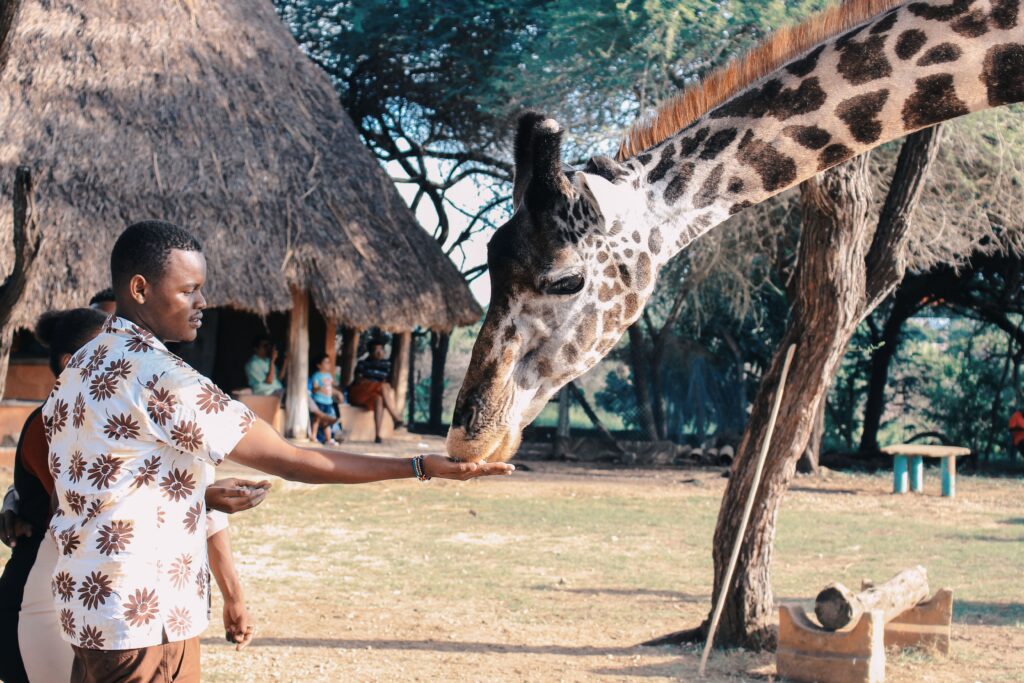Published on September 30, 2022.
By: Priscilla Wiredu

What comes to mind when you hear the word “Africa”?
Tropical forests abundant with wild animals?
A drought-ridden wasteland with starving people?
Or do you think of the opening scene from the 1994 Disney hit movie The Lion King?
I put forth this question to allude to the idea that many mythical thoughts come to mind when you hear the word “Africa.” It is commonly envisioned as a folkloric, tropical-enriched paradise, while simultaneously being a poverty-ridden desert where a primitive lifestyle exists.
The picturesque imagery of the world’s second-largest continent has been one in the making for a while–an image that fits the narrative of Black culture and their native homeland.
When Africa was discovered to be a mineral-rich land with an endless workforce, European countries worked overtime to look for ways to enforce their unethical practices and forceful takeover of almost every nation in Africa.
Even after being granted independence, these nations continue to feel a power imbalance due to the influence of colonialism and Western culture. This impact has left citizens of Africa with an altered notion of what Africa should look like.
Fetishization
The title of this article is a reference to Toto’s 1982 cultural hit “Africa,” a song romanticizing the continent, with a music video depicting certain cultural stereotypes. The mysticism surrounding Africa causes Western society to believe it is a unified place of unspoken legends, witch-doctor practices, and other phenomena that are intimidating and exciting to those who have never stepped foot on the continent.
Of course, Black people have been able to manipulate this example of fetishization to their own benefit. In 1988, Actor and Comedian Eddie Murphy wrote and starred in Coming to America, the tale of a wealthy king travelling to New York from the fictional African country named Zamunda in hopes of finding love before submitting to his arranged marriage.
The film’s depiction of an African country, its wealthy royals, and its cultural lore generated an interest in the continent, hoping to show the wealthier and royal side of European countries like Britain and France, in the entertainment industry. However, the humour in the film also creates a short-handed impression of African behaviour. As Murphy’s character adjusts to American culture and his identity is slowly revealed, he is treated differently and targeted in a negative way for his wealth.
Another seemingly innocent example of African fetishization can be seen in the movie Disney’s The Lion King, an animated retelling of Shakespeare’s Hamlet. The film depicts a beautiful scenic imitation of African safaris where the animals live in harmony under the reign of the king lion Mufasa, until his brother, Scar, moves to steal the throne of Pride Rock. It is not specified where in Africa the film takes place; however, there is a scene of Mount Kilimanjaro, which would infer that the location is in Tanzania.
Stereotyping
If you have seen a commercial encouraging you to donate to a foundation to support a starving child, watched a documentary on wildlife, or seen the band USA for Africa’s hit “We are The World,” in 1985, you will notice Africa as a backdrop. Black American celebrities, in attempts to help unify Black audiences and themselves, fail to recognize that the way people view Africa is a direct representation of harmful stereotypes.
In the late 90s and early 2000s, Black people who were not from Africa were convinced to believe that all Africans are dying, starving, and subhuman, simply waiting for financial aid from Western countries to save them from their squalor. Despite these harmful stereotypes, African nations continue to focus on redeveloping their economies and governance to stability independently before colonialism. Post-colonialism makes this challenging, as many underlying issues need to be addressed. Still, African countries have been able to hold onto preserving their country with the resources they have left.
Here are some of the top harmful stereotypes about Africa debunked:
Africa is a Country
Africa has been muddled to appear as one primitive, impoverished, and tribal country when it is in fact, a multitude of African cultures, nations, regions, and cities. When someone refers to African food, art, or language, they are intentionally grouping hundreds of unique communities into one.
Homing 54 countries, more than three thousand ethnic groups, and a whopping population of 1.2 billion, Africa is the second-largest continent in the world, with enriched dialects and religions, from Christianity to Islam to Indigenous traditions.

Africa is a Jungle
Many believe that the parts of Africa that are not barren wastelands are tropical jungles filled with ferocious beasts and tribal people. Malcolm X, an African-American Muslim minister, human rights activist, and prominent figure in the Civil Rights Movement, had visited many African countries in his lifetime. He fought against this depiction of Africa, claiming that these stereotypes are harmful and caused Black Americans to further stray from their continent, their homeland.
X claimed that this jungle stereotype portrayed Africans as “savages, cannibals, untamed, uncivilized.” In reality, Africa is home to an incredible number of vegetation zones, with only a small percentage of land occupying rainforests or jungles. Africa also has many civilized countries, such as Nigeria, the Democratic Republic of Congo, Rwanda, Ghana, and Egypt to name a few.
Egypt is not part of Africa
This is possibly the most incredulous belief to be debunked. Egypt sits in the middle of Northeast Africa, bordering Libya, Sudan, the Mediterranean Sea, the Red Sea, and Israel. Yet despite the location, Egypt has been generalized as a Middle Eastern nation instead of African.
Scientists have claimed that ancient Egyptians were not of European or Sub-Saharan African descent, but composed of a unique ethnic group of its own. In a study by John H. Relethford in his scientific journal “Fundamentals of Biological Anthropology,” skulls from both European and African ancestors were compared to Egyptian ones and findings revealed that there were no similarities. Despite this finding, it’s important to state that Egypt does reside in the African continent, contributing to Africa’s racial diversity.
Whitewashing
Following the previously debunked stereotype towards Egypt, Western society has used this ethnically ambiguous group of people to their advantage when depicting Egyptian characters to the Western masses.
European imperialists refuted the scientific evidence that ancient Egyptians were African.. By doing this, they are able to take credit for one of the most civilized nations in world history, along with their art, artifacts, and customs depicting them as Black with curly hair.
However, if one were to watch the 2016 film Gods of Egypt, or even the 1963 film Cleopatra, you will see the actors portraying ancient Egyptians as any other race but Black. This is due to racial prejudice and alleged stripping of one’s culture. European imperialists did not want the West to know about how rich, diversified, and efficient African nations were.
Instead, they took the one culture that was easiest to whitewash due to its deep connections with European societies, and did just that. Despite what science, history, and research have shown, that even Egyptian royals such as Cleopatra, Tutankhamen, and many others were genetically Black, Western media decided to make them Caucasian to appeal to the belief that White people civilized Africa.
Why do People Do this?
The effects of colonialism, imperialism, slavery, and racism are the most obvious answers to why this collective demonization of Africa is so prominent in the West. However, a more in-depth look will reveal that media as a form of brainwashing plays an important role in making profit.
University of London, Film and Screen Studies Professor Lindiwe Dovey claims that through most African-centric movies, “Africa is often depicted as monolithic.” Dovey challenges this belief through her work, arguing that Africa is an enriched continent that deserves many of its facets to be studied properly and embraced.
In accordance with Dovey’s argument, Film Director Gabrielle Tesfaye challenges the fact that Africa is constantly misunderstood and generalized in other forms of media. She theorizes that this is because it remains an unknown location to most Western individuals.
“They never see it for themselves,” Tesfaye explains. “They really don’t know how diverse it is. It is not as travelled as Asia, South America, or even Europe.” The ignorance is evident when people watch whitewashed or mystic media about Africa, generating their own prejudices about the continent.
It is important to acknowledge the harms of these beliefs and to challenge them by educating others about Africa, its history and customs, and to spread that knowledge to future generations to diminish ignorant stereotypes.
Some resources to help learn more about the diversity of Africa are:
‘Appreciation of diversity and inclusion in Sub-Saharan Africa: The socioeconomic implications” a journal article written by Kofi Appiah Erasmus
National Geographic offers many resources that discuss important information about Africa.
The Royal Ontario Museum hosts an all-year long project that showcases Africa and refutes its historical and contemporary stereotypes. Curators present and promote cultural and artistic African diasporas to highlight issues with stereotyping and how it impacts the present and evoke the potential future.
Priscilla Wiredu is a writer for this year’s Black Voice project. An alumni of York University, she graduated with Honors where she studied Social Sciences. She then went on to get an Ontario Graduate certificate in Creative Writing from the Humber School for Writers, and a college certificate in Legal Office Administration at Seneca College. She is currently studying for the LSAT in hopes of going to law school. Her main goal as a Black Voices writer is to ensure Black issues and Black Pride are enunciated through her works.

